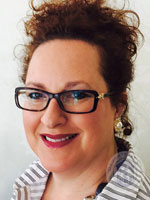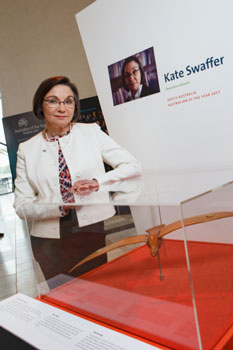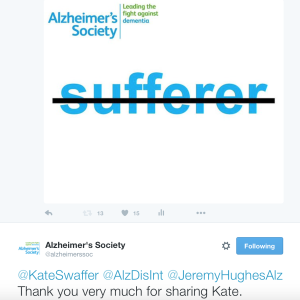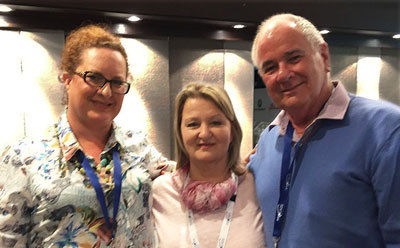Hello,
I thought it was time again to hear from THE experts on dementia – and that is the people who have a dementia diagnosis themselves.
I would like to introduce to you, Kate Swaffer – 2017 SA Australian of the Year.
Kate, a retired nurse, was diagnosed with a form of dementia in her 40s. Since diagnosis Kate has completed a Masters of Science in Dementia Care and is part way through a PHD. Kate is also on the Board of Dementia Alliance International, the peak body representing the global voice of people diagnosed with dementia.
Reprinted with Kate Swaffer’s permission, here is her most recent blog:
Please… the time is NOW for respectful language
Over the years, it has come to my attention that others speak about me as one of the #DementiaLanguagePolice. There are many of us around the world, and we constantly have to put up with being labelled sufferers of dementia, even when most of the time, we are more often suffering because of this label, and the poor care, or no care received after our diagnosis. We also suffer due to those who accuse us of lying, or who persist in saying “But you don’t look like you have dementia.”
A recent article in the Huffington Post was the third example of being collectively labelled as sufferers in as many days! When will people without dementia start respecting people living with dementia? I can’t speak for others with dementia on this one, but feel free to call me retarded if you wish, as personally, that offends me far less than being labelled a dementia sufferer. Many of the advocacy organisations also advocate for this change, and many have Dementia language guidelines, but still, too often those in the media refuse to change…
Chris Roberts has said publicly at a conference I attended some years ago; ‘I may suffer some of the time, but do not label me a sufferer.’ Many have spoken about how offensive this is, long before I became a dementia activist. Helga Rohra speaks about it, as does Keith Oliver, Christine Bryden, Wendy Mitchell, Mick Carmody, Brian Le Blanc and SO MANY OTHERS… The late Peter Ashleigh and Dr Richard Taylor also spoke strongly on this topic.
Disrespectful language contributes significantly to the stigma, discrimination and isolation we continue to experience, and this is supported not only with vast amounts of anecdotal and anthropological evidence, but also with a significant amount of evidence based research.
Please… the time is now for respectful language.
By Kate Swaffer
Today I listened to 12 people with dementia talk about how words hurt
Today I listened to 12 people with a dementia diagnosis talk about how words stigmatise them and limit their whole person humanity. Yes, they do say they suffer with their illness but no, they are most definitely not “sufferers”. Sufferers is a word that disempowers them and does not reflect the truth of their lived experienced, which is, they are whole people who can and do live well, despite their dementia. They would live even better lives if society realised that they have a disability and need “cognitive ramps” to compensate for their condition.
The problem is our attitude and use of one-word labels
A large part of the problem is that one word – dementia – is used as an umbrella word to describe over 150 dementia conditions and that one word dementia is highly stigmatised with ‘pre-conceived ideas’ about what it means to have a dementia diagnosis. More often than not, those ideas are wrong. Not only is one word used to describe over 150 medical conditions but it doesn’t allow for the fact that the experience of living with dementia changes over time. Society sees people living with late-stage and end-stage dementia and then they think of dementia in that context alone. This denies the experience of the people living with early and mid-stage dementia.
Sue Pieters-Hawke said at a conference – “the problem is we see people with dementia as ‘less than’. Less than us, less than human”. She argued that if we truly saw people with dementia as valid, whole, equal humans with a disability we would not use the negative, demeaning words we use to describe people with a dementia. It was a confronting point of view that amplified the silence of the professional audience listening, who unfortunately, still in their presentations used many inappropriate negative labels to describe people with a dementia diagnosis. Sue’s point of view was the unspoken truthful elephant in the room. It had to be said. It was a call for the industry and society to be more intelligent, considered, thoughtful, kind and truthful in our use of words.
We under-estimate people with a dementia
In my experience, people with a dementia are more often than not under-estimated by society, even by their loving family, and this is the point Kate Swaffer and Dementia Alliance International, the peak body representing people diagnosed with dementia, are making…to sum up their life as “sufferers” is a negative and stigmatising label. Their true life experience is much richer …rich with functional ability, intelligence, love, humour and joy. At least that has been my experience of what I have witnessed of the lives of Daughterly Care clients.
Kate Swaffer, Christine Bryden and Dementia Alliance International are right….we do need our language to be more respectful, positive and supportive of a dementia disability. We also need to spend less time focused on losses and think how we can support the person’s continuing abilities and their emerging needs. People with a dementia need respect and helpful support. They need “cognitive ramps” for their dementia disability.
Another first for Daughterly Care
To better support and enable our clients, Daughterly Care has had 6 staff accredited to become Montessori Trainers in order to train our 200+ Community Caregivers on the Montessori way of supporting and enabling clients with a dementia diagnosis. Daughterly Care is the first community home care provider to do this in Australia, some Nursing Homes have made this investment, but we are the first community care organisation to adopt the Montessori Method.
It’s a massive investment in terms of cost and time, however the evidence based research supports the effort and we are always looking to offer best practice care and support.
The Montessori Framework is all about supporting Elders positively and focusing on enabling, re-enabling and support that leads to greater self-esteem and well-being. It’s perfectly aligned to Daughterly Care’s Joyful Living Approach™ to support and care. You can read about the 12 principles of the Montessori Method and Dr Maria Montessori here.

Kate Lambert
B.Ec F.Fin
Daughterly Care CEO & Co-Founder




Hi Kate – lovely to read your information and support for people with dementia. Such a shame these people are labelled as if they have become deranged. People should be more mindful of their words and opinions and think of other’s feelings. Should people be taught ‘Mindfulness’ and ‘Selflessness’ in school and work places? Good on you Kate once again.. Irena Z
Hello beautiful Irena, thank you for your kind words. Yes, it would be great to learn mindfulness at school as children are sponges and so eager to learn. What they learn becomes part of their DNA. The Head Master of an Elite Private Boys School recently told parents that prospective employers have told him that what they most want is to employ is EMOTIONALLY INTELLIGENT young men and women. Wow! Music to my ears..the rise of importance of emotional intelligence. Daughterly Care is co-owned by a Baby Boomer, Verlie Hall, RN…so we understand Baby Boomers are going to change expectations for the respect we give older people and the higher expectations and service they will expect and demand. We look forward to continuing our 19 years history of providing the superior service that Baby Boomers expect.
Hi Kate, Thank you for sharing this information. For a busy daughter (aren’t we all though!) I find you are a great connection into the research and discussions going on around dementia and care.
I would love discussion around “respectful language” to take a step back to the basics though. I am often astounded by the number of times my mother, living with dementia, is referred to in the third person IN HER PRESENCE. This is not unusual unfortunately from carers, medical staff and others in the community. Some people understand not to do this innately and manage to convey information “about” mum in an all inclusive conversation which works well. Others just do not take a hint! Unfortunately mum is too polite to make a direct comment in these circumstances, choosing to wait until we are alone to either express her great annoyance, feeling she is ignored and disrespected, or ask, confused, who we were just talking about!
Thank you Karen, for your insightful comment. Yes, this is part of the same problem and as you say step back to get basic communication right. As a society, we assume people with a dementia cannot speak for themselves so we talk to the spouse, adult child about the person with a dementia etc rather than speak to the person themselves. You don’t need dementia to experience this – many older people experience this “invisible” feeling where they are taked about in front of them, instead of being taked to. Thank you for sharing your point of view.